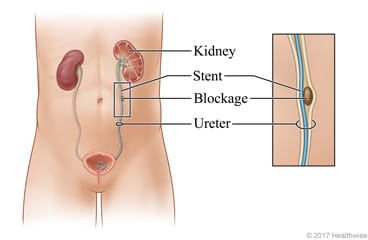Ureteral Stent Placement: Before Your Procedure

What is ureteral stent placement?
A ureteral (say "you-REE-ter-ul") stent is a thin, hollow tube. It is placed in the ureter to help urine pass from the kidney into the bladder. Ureters are the tubes that connect the kidneys to the bladder.
This procedure is done when something is blocking the ureter. The blockage may be caused by problems such as a kidney stone, a tumour, or an infection. The stent keeps the ureter open. After the stent is placed, urine should flow better from your kidneys to your bladder.
You will get medicine to make you sleep and to prevent pain during the procedure. The doctor will place the stent by guiding it up the urethra. The urethra is the tube that carries urine from the bladder to outside the body. Then the doctor will pass the stent through the bladder and ureter into the kidney. The doctor will place one end of the stent in the kidney and the other end in the bladder.
The stent may be left in place for several days. Or you may have it in place for several months. While the stent is in place, you may have to urinate more often. You may feel a sudden need to urinate. Or you may feel like you can't completely empty your bladder.
How do you prepare for the procedure?
Procedures can be stressful. This information will help you understand what you can expect. And it will help you safely prepare for your procedure.
 Preparing for the procedure
Preparing for the procedure
- Be sure you have someone to take you home. Anesthesia and pain medicine will make it unsafe for you to drive or get home on your own.
- Understand exactly what procedure is planned, along with the risks, benefits, and other options.
- If you take a medicine that prevents blood clots, your doctor may tell you to stop taking it before your procedure. Or your doctor may tell you to keep taking it. (These medicines include aspirin and other blood thinners.) Make sure that you understand exactly what your doctor wants you to do.
- Tell your doctor ALL the medicines and natural health products you take. Some may increase the risk of problems during your procedure. Your doctor will tell you if you should stop taking any of them before the procedure and how soon to do it.
- Make sure your doctor and the hospital have a copy of your advance care plan. If you don't have one, you may want to prepare one. It lets others know your health care wishes. It's a good thing to have before any type of surgery or procedure.
What happens on the day of the procedure?
Follow the instructions exactly about when to stop eating and drinking. If you don't, your procedure may be cancelled. If your doctor told you to take your medicines on the day of the procedure, take them with only a sip of water.
Take a bath or shower before you come in for your procedure. Do not apply lotions, perfumes, deodorants, or nail polish.
Take off all jewellery and piercings. And take out contact lenses, if you wear them.
At the hospital or surgery centre
When should you call your doctor?
- You have questions or concerns.
- You don't understand how to prepare for your procedure.
- You become ill before the procedure (such as fever, flu, or a cold).
- You need to reschedule or have changed your mind about having the procedure.
Current as of: April 30, 2024
